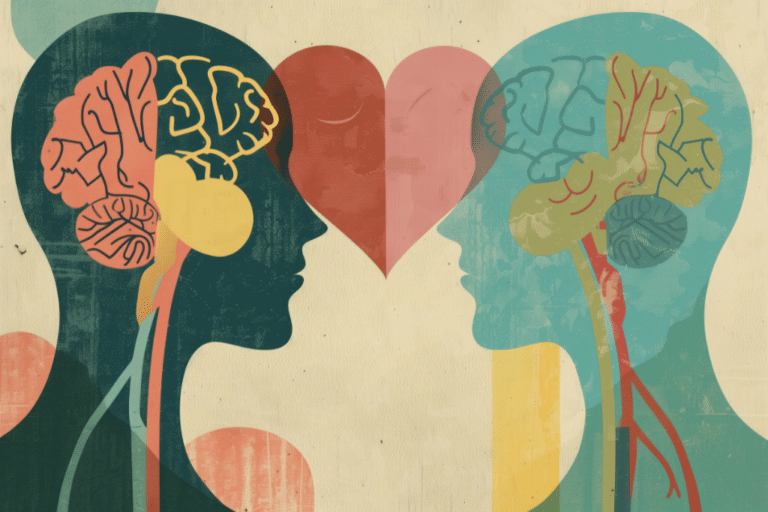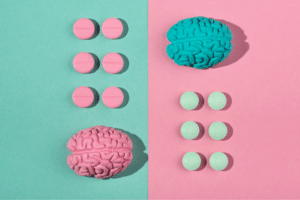4 min read
Love on the Brain: What Happens to Your Brain When You Fall in Love
Have you ever wondered what happens inside your brain when you fall in love? Is it all just butterflies in your stomach, or is there a deeper, more complex process at play? Falling in love isn’t just a romantic feeling—it’s a scientific phenomenon that activates various brain regions, triggers hormone releases, and even alters how you think and feel. In this article, we’ll dive into the science of love, exploring how it affects your brain, and how love can be both exhilarating and transformative.

The Science of Love: How Falling in Love Affects Your Brain
Imagine this: You’ve just met someone who seems to light up the room. The moment your eyes meet, a rush of excitement floods your body. But what’s happening inside your brain? The answer is simple: a cascade of chemical reactions is unfolding in real-time. When you fall in love, your brain activates regions responsible for pleasure, motivation, and reward. The brain’s reward system goes into overdrive, much like when you eat your favorite food or win a prize.
Several parts of the brain get involved in love, such as the ventral tegmental area (VTA), the caudate nucleus, and the putamen. These areas are all linked to feelings of desire, motivation, and excitement—explaining why love can feel like a natural high. It’s as if your brain is telling you, “This is important. Pay attention!”
But it’s not just the regions involved in pleasure that light up when you fall in love. Your brain also experiences something deeper: it’s preparing for a long-term bond. This makes sense because, at the heart of romantic relationships, your brain wants to build connections that last. And your brain does this by releasing hormones that trigger everything from trust to attachment.
Neurotransmitters and Hormones: The Chemical Drivers of Love
So, how does the brain actually create the feeling of being in love? It all comes down to neurotransmitters and hormones. When you’re falling for someone, your brain releases a cocktail of chemicals that shape your emotional and physical response to the person.
Dopamine and Oxytocin: The Love Hormones That Shape Your Brain
One of the most well-known neurotransmitters in love is dopamine, often referred to as the “feel-good” chemical. Dopamine is responsible for that rush of excitement and pleasure you get when you see your partner or think about them. It’s the same chemical that floods your brain when you experience other rewarding activities, like eating chocolate or winning a game. The more dopamine your brain releases, the more you feel that thrill of attraction.
Then, there’s oxytocin, the hormone that strengthens your emotional bond. Known as the “bonding hormone,” oxytocin promotes trust, intimacy, and connection between partners. It’s what makes you feel closer to someone and builds attachment over time. It’s also the reason why hugs and physical touch feel so good in relationships—they trigger the release of oxytocin, reinforcing feelings of closeness and security.
Together, dopamine and oxytocin create the perfect environment for a thriving, healthy relationship. While dopamine keeps the excitement alive, oxytocin deepens the emotional connection.

The Benefits of Falling in Love: From Stress Reduction to Joy
Falling in love isn’t just about the excitement; it comes with tangible benefits for both your emotional and physical health. The moment you fall in love, your body goes into “relaxed mode.” Love has a powerful ability to lower levels of cortisol, the stress hormone, which can make you feel calm and at ease.
How Love Impacts Your Brain Health and Emotional Well-being
In addition to lowering stress, the benefits of falling in love can extend to your mental and emotional well-being. Research shows that romantic love can improve your overall mood, reducing the symptoms of anxiety and depression. The serotonin boost from love makes life seem brighter, and it even helps you feel more resilient in tough times.
But it doesn’t stop there. Long-term relationships, where love is consistently nurtured, have been shown to improve brain function and cognitive health. In fact, people in strong, loving relationships often report better mental health as they age. It seems that the brain thrives on positive, emotional connections. So, love isn’t just a feeling—it’s a mental workout that keeps your brain sharp.
The Role of the Prefrontal Cortex and Amygdala in Romantic Love
As you deepen your connection with someone, your brain doesn’t just focus on pleasure. Other regions come into play, including the prefrontal cortex and the amygdala, both of which play crucial roles in decision-making and emotional regulation.
The prefrontal cortex is responsible for making rational decisions. But, when you’re in love, this region doesn’t always function as it does when you’re thinking logically. Love can cloud your judgment, which is why people in love sometimes make impulsive or emotional decisions. It’s as if your brain is saying, “Go ahead and take the leap.” Meanwhile, the amygdala, which processes emotions like fear and excitement, also becomes highly active, adding an extra layer of intensity to your feelings.
Critical Judgment and Decision-Making: How Love Affects Your Brain’s Judgment
Have you ever found yourself making a decision you wouldn’t normally make—like saying something impulsive or taking a spontaneous trip? That’s the amygdala at work. When you’re in love, your brain focuses more on emotional experiences than on rational thinking, which explains why love can sometimes lead to decisions that feel right in the moment but may not be the most logical in hindsight.
The Long-Term Effects of Love on the Brain: What Happens Over Time
Love is not just a fleeting feeling; it can have lasting effects on the brain. Over time, as relationships evolve, the brain becomes even more attuned to emotional bonds. With each shared experience, the bond between you and your partner grows stronger.
The brain’s continued release of oxytocin and dopamine solidifies this connection, making it easier to maintain a loving relationship in the long term. But the process is not just about the brain chemistry—it’s also about building trust and attachment, creating a lasting emotional connection that can survive life’s challenges.
The Lasting Benefits and Challenges of Being in Love
While love certainly offers lasting benefits to mental and emotional health, it’s not without its challenges. Over time, the intensity of initial romantic passion may fade, but love doesn’t disappear. Instead, it transforms into a deeper, more stable form of attachment. The key to a lasting relationship lies in continuing to nurture that bond, making sure to maintain communication, empathy, and emotional support.
Conclusion
Love is a powerful force that changes the way we think, feel, and experience the world. From the moment you fall in love, your brain is flooded with chemicals that enhance pleasure, connection, and joy. Over time, love can improve your emotional well-being and even strengthen your brain health. By understanding the science of love, we gain a greater appreciation for the incredible impact romantic relationships have on our lives.
Frequently Asked Questions (FAQs)
How does falling in love affect the brain?
When you fall in love, your brain undergoes several significant changes. The reward system in your brain is activated, leading to the release of chemicals like dopamine and oxytocin, which promote feelings of pleasure, excitement, and attachment. These chemicals enhance your emotional connection to the person you’re in love with and contribute to the euphoria often associated with romance. The areas of your brain involved in motivation, reward, and goal-oriented behavior (like the caudate nucleus and ventral tegmental area) become highly active, making you feel motivated and focused on your partner. Additionally, your brain may temporarily reduce its activity in regions associated with judgment and rational thinking, explaining why people sometimes make impulsive or emotional decisions when in love.
What happens to you when you fall in love emotionally?
Emotionally, falling in love can feel like a whirlwind. The release of dopamine creates excitement and pleasure, while oxytocin promotes feelings of trust and attachment. These emotional shifts can lead to increased happiness, a sense of connection, and emotional security when you’re with your partner. Love often results in emotional highs, where you’re filled with joy and anticipation. It can also reduce anxiety, as your brain releases lower levels of cortisol, the stress hormone, making you feel calmer and more relaxed. However, love can also make you vulnerable, as it may stir up deeper emotional experiences, including fear of rejection or heartbreak, especially in the early stages of a relationship.
What happens to a man’s brain when he falls in love?
When a man falls in love, his brain reacts similarly to anyone else, with a few subtle differences. The key chemicals, dopamine and oxytocin, still play a crucial role in creating feelings of joy, attraction, and attachment. Studies suggest that men might experience a greater surge of dopamine when they first fall in love, which could make them feel particularly driven and excited about the relationship. Men may also show a stronger response in areas of the brain related to reward and goal achievement, which might explain the enthusiasm they often express in the early stages of love. Over time, as the bond deepens, the emotional connection grows stronger due to oxytocin’s effect on promoting closeness and trust.
What are the bad effects of love on the brain?
While love has many positive effects on the brain, it can also have some negative consequences. In the early stages of a relationship, the intense emotional highs driven by dopamine can sometimes lead to irrational decision-making, making it difficult to think clearly. This can result in impulsive behavior or poor judgment. Additionally, love can cause emotional vulnerability, particularly when there is fear of rejection or heartbreak, which can lead to stress, anxiety, or even depression. In some cases, obsessive thinking about a partner can activate the amygdala, the brain’s emotional center, causing heightened feelings of anxiety or jealousy. Lastly, love’s ability to lower cortisol (the stress hormone) can sometimes mask deeper emotional challenges, potentially delaying important personal reflections or issues that need to be addressed.
Is love good for your mental health?
Yes, love can significantly benefit your mental health. Being in a loving relationship is linked to lower levels of stress, increased feelings of security, and better overall emotional well-being. The presence of oxytocin promotes feelings of trust and emotional bonding, which contribute to a sense of emotional stability. Additionally, being in love can decrease the symptoms of depression and anxiety, as it triggers a boost in serotonin and other positive mood-enhancing chemicals. Long-term, love can even improve brain health by encouraging emotional resilience and cognitive sharpness, especially in older adults. However, it’s important to note that love must be healthy and mutually supportive for these mental health benefits to be fully realized.

